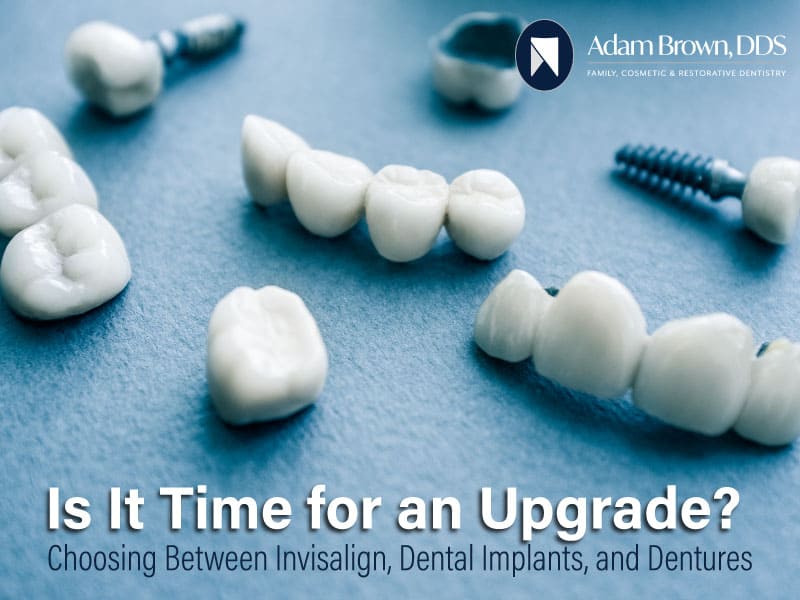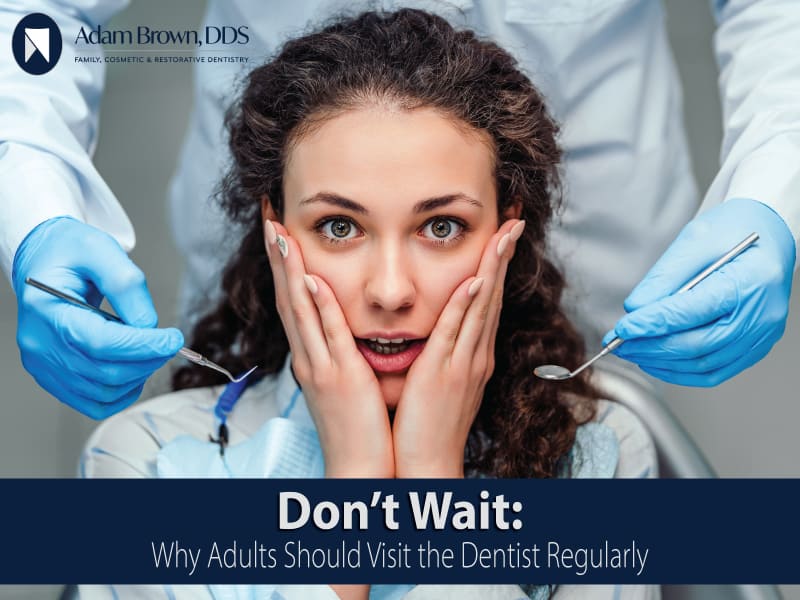Is It Time for an Upgrade? Choosing Between Invisalign, Dental Implants, and Dentures

If you feel this is the year to upgrade your smile, you have options. Adam Brown DDS offers several dental treatments that can give you the smile you’ve always wanted!
Three of the most popular treatments include Invisalign, dental implants, and dentures.
The solution that works best for you will depend on your specific needs and preferences, and our office can help you make the right decision. But for now, let’s break down these three types of dental treatments and discuss how they can take your smile design to the next level!
What Is Invisalign?
Invisalign is an alternative to traditional metal braces. These clear aligners are used for teeth straightening, and they gradually shift teeth into their optimal positions.
When using Invisalign, you don’t have to worry about metal brackets, wires, and other inconveniences of traditional braces. Most teenagers and adults who wear their aligners for the recommended 22 hours a day can correct their orthodontic problems.
The Benefits of Invisalign
When wearing metal braces, there are many foods that you must avoid, including corn-on-the-cob, popcorn, caramel, chewing gum, and chewy candies. Carrots, hard fruits and vegetables, nuts, and steak are also off-limits.
Because you can remove your aligner trays before meals and snacks, you can eat (and drink) whatever you wish, as long as you brush or rinse your teeth with water before re-applying the aligners.
The most obvious benefit of using clear aligners is that they are virtually invisible. Everyone knows you are undergoing orthodontic treatment when wearing traditional braces, but the average onlooker would not be able to tell when you are wearing Invisalign; the thin clear plastic is almost invisible.
Furthermore, it is easier to maintain oral hygiene when taking Invisalign treatment. It is common to notice stains on your teeth after wearing metal braces, if not gingivitis or cavities. Essentially, it is pretty challenging to brush and floss around metal wires and brackets, and even if you dedicate the extra time and effort, you may not be able to get into all the places you need to.
All you have to do with Invisalign is remove the aligners, then brush and floss as you usually would. You can even clean your trays by soaking them in a cleaning solution or brushing them with a soft-bristle toothbrush.
Invisalign proves as effective as traditional braces for many patients, and they are much more comfortable. The smooth plastic fits snuggly to teeth, and you don’t have to worry about any brackets or wires poking your gums or cheeks.
Even if you pay more for Invisalign, understand that emergency dental visits are less likely to occur because clear aligners are remarkably strong. There are no brackets or wires to break off. Moreover, more dental insurance plans are covering Invisalign.
What Are Dental Implants?
Dental implants are primarily used to replace missing teeth. Missing teeth can impact chewing and speaking, lead to severe teeth misalignment, and cause gradual bone loss. While there are several ways to replace one or more missing teeth (e.g., dental bridges, partial dentures, complete dentures, etc.), dental implants have become one of the most popular choices because they offer many benefits.
The patient undergoes a minor procedure to replace the missing tooth’s root with a post; then, the dentist puts a permanent dental crown onto the implant.
Benefits of Dental Implants
Getting dental implants is not the cheapest treatment, but it is often the most effective way to replace missing teeth. It can help you maintain clear speech, make chewing food more manageable, and provide superior comfort. Implants also look entirely natural, are easy to maintain, and are durable enough to last for many years.
What Are Dentures?
Dentures are another way to treat lost or removed teeth. A dentist (or laboratory) fabricates these sets of artificial teeth and gums to fit each patient’s mouth. You can get full or partial dentures. In other words, you can either replace a few missing teeth or all teeth on the top or bottom gum line. No matter what type of dentures you receive, you will have them custom-designed to match surrounding teeth and fit your mouth visually.
Benefits of Dentures
Dentures are typically a less expensive solution for improving a smile and avoiding various oral health issues. They can support the structures around the lips and cheeks, plus they allow you to eat foods as you usually would and speak clearly. Your dentist will recommend whether dental implants or dentures are the best treatment for your situation.
Dental Implants vs. Dentures
As we’ve discussed, both dental implants and dentures are viable solutions for replacing one or more missing teeth. The best treatment for you will depend on preference, price, jawbone health, and other factors. Let’s talk about these two treatments in more detail:
Dental Implants Procedure
When getting dental implants, the dentist will replace the missing tooth’s root with an implant that they will cap with a crown. This involves extracting the damaged root and inserting a metal prosthetic root (called a “post”) deep into the bone. Once the bone has grown around the post to secure it, the dentist will place an abutment onto it before applying the crown.
Sometimes, the abutment can be placed during the same procedure as the implant, while other times, it can take a couple of months for the bone to bond to the post.
Dentures Procedure
Dentures are prosthetic, removable teeth for replacing one or many missing teeth. The dentist takes an impression of your mouth (upper gums, lower gums, or both), depending on which teeth need to be replaced. The dentist will also observe your jaw alignment and bite to ensure the dentures can improve your speech and ability to chew.
Then, a lab will fabricate preliminary dentures for the dentist to fit in your mouth and make any necessary adjustments to the set’s alignment and length. The dentist will then order your final set of dentures so that your teeth and gums look as natural as possible.
Costs of Dental Implants and Dentures
Dental implants cost more than dentures. Each dentist’s office varies on price, but the American Dental Association (ADA) estimates that an implant runs from $1,600 to $2,200 per tooth. In comparison, the ADA reports that a patient can receive a complete set of upper or lower dentures for about $1,600.
Maintenance of Dental Implants and Dentures
Caring for dental implants is as simple as caring for natural teeth. All you have to do is brush twice a day, floss once a day, and go to your regular checkups at Adam Brown DDS.
Dentures require more maintenance to remain effective. For instance, you must soak them overnight in water or a cleaning solution. You must also remove your dentures and brush them after each meal or snack, and you will need to ensure that you brush any adhesive revenue from your gums.
Another thing to consider is that you will need to have your dentures refitted now and then as your bite changes. Conversely, dental implants are permanent, though you might need to replace a cracked or broken crown.
Choosing Between Dental Implants and Dentures
Your dentist can help you make the right decision concerning dental implants or dentures. But here are a few factors to consider when thinking about your dental future:
Age
Dental implants can last for decades, meaning that people in their sixties or younger might get the most out of these permanent prosthetic teeth. Many older adults prefer to get dentures because they don’t require a time-consuming or invasive procedure.
Jawbone Density
Before you get dental implants, your dentist must ensure there is enough jawbone material to support the posts. If there isn’t, implants might not be a viable solution.
Age, gum disease, tooth loss, and injury are the most common culprits of jawbone loss. With that said, some dental practices perform bone grafting to support jawbone density, which could be a good option if you can afford the additional time and costs.
Comfort and Effectiveness
In most cases, dental implants feel more comfortable than dentures, and they also make chewing and speaking feel more natural. There are implant-supported overdentures; however, they can provide better comfort and chewing efficacy than conventional dentures.
Oral Hygiene
You also need to consider daily hygiene when choosing between dental implants and dentures. Dentures require more time and effort to keep viable, while implants are lower maintenance. Keep an honest assessment of how willing and able you are to care for your dentures each day.
Can I Choose More Than One Dental Treatment?
Yes, it’s possible to get more than one dental treatment at a time. Let’s discuss your options:
Can I Wear Invisalign with Dental Implants?
Some patients receive a dental implant and wish to correct their crooked teeth somewhere down the road. Implants are permanent fixtures, meaning they will not move from their original position. But your dentist can use clear aligners to reposition all the surrounding teeth. Typically, you can still get Invisalign in this situation.
With that said, if you only have a few remaining natural teeth, Invisalign may not be the ideal option. Adam Brown DDS can thoroughly evaluate your situation and help you find the best solution.
Which Treatment Should I Get First?
If you have not received dental implants or Invisalign treatment, you may be wondering which you should get first. Understand that Invisalign holds your natural teeth in their sockets and gradually moves them into proper alignment.
On the other hand, dental implants attach directly to the jawbone, which bonds directly to the implant over time. Thus, implants are permanently fixed, and it is typically best to straighten your teeth with aligners before having implants inserted.
When your teeth are aligned before implant placement, it ensures that all your teeth are in their optimal positions. Then, you can replace missing teeth with implants and crowns that look natural and aesthetically pleasing with surrounding teeth. Furthermore, your dentist can ensure that the gap remains healthy during the Invisalign treatment.
Are Dental Bridges a Viable Alternative?
Dental bridges are another type of treatment for missing teeth. Dentists can use a dental bridge, sometimes called a fixed partial denture, to fill the gap left by one or more missing teeth. Essentially, the bridge attaches to the surrounding teeth to support the mouth’s structure.
Dental bridges are less expensive than implants, and most patients who receive them are satisfied with the result. However, some people are confused about the appropriate care and maintenance responsibilities, leading to bridges becoming ineffective or unsanitary.
If you choose to get a bridge, ask your dentist for comprehensive care instructions to ensure your device works well and allows you to maintain oral hygiene.
Conclusion
It’s 2022, and it could be the ideal time to upgrade your smile! While there are many available dental treatments, Invisalign, dental implants, and dentures are some of the most popular options among patients.
Along with considering the information and advice above, contact Adam Brown DDS to schedule a consultation. We would love to speak with you, go over your options, and help you make the best decision for your future smile and dental health!

